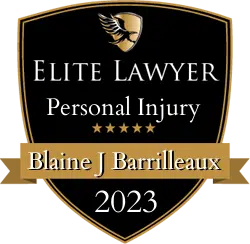Louisiana is home to multiple bodies of water which provide numerous jobs to local residents. Although the waters create job opportunities for countless people, it can also be a dangerous place to work. Work accidents can occur at any moment on the water and it’s important to know what legal options you have after suffering an injury.
In most cases, those who have suffered injuries while on the job can use workers’ compensation to help cover their medical expenses and lost wages. However, rules apply differently to maritime workers.
If you or a loved one has been injured while at sea, call The Law Offices of Blaine Barrilleaux today. Our offshore accident lawyers have over 25 years of experience helping innocent victims recover compensation for their injury cases. Whether it’s an offshore injury, onshore injury, or overboard accident, our team can help.
Maritime Law And Admiralty Law
Maritime and Admiralty laws cover activities on navigable waters, such as oceans, rivers, large lakes, and any bodies of water where commercial shipping occurs. In situations involving incidents in these environments, the expertise of offshore injury attorneys becomes invaluable.
What Is The Jones Act?
The Jones Act is a law that specifically applies to seamen or merchant mariners who have been injured while aboard ships. The Jones Act provides the injured victim with compensation for any injuries that occurred due to the negligence of a fellow seaman, the vessel’s owner, the captain, or another member of the ship’s crew.
How To Support Your Potential Legal Claim
After an accident has occurred, it can be overwhelming to know what steps you should take. Here are a few suggestions from experienced offshore lawyers that you can follow to help you after experiencing an injury:
- Inform your employer- It’s important to let your employer know immediately that you were injured on the job.
- Seek medical attention- Even if your injury does not appear to be severe, it’s still important to see a doctor.
- Keep a record of all your expenses- Depending on the seriousness of your injury, you may need future treatment to recover. It’s in your best interest to keep track of your expenses in order to receive fair compensation.
- Contact our offshore accident lawyers– When you contact one of our personal injury attorneys, we will review your case to see if you’re eligible for compensation.
Common Maritime Accidents
According to an offshore injury lawyer, common maritime accidents can include:
Falling Overboard
An individual can fall overboard for numerous reasons. Whether due to loading cargo or fishing, falling into the water can be dangerous and result in hypothermia, drowning, or other serious dangers.
Fishing Injuries
According to the U.S. Bureau of Labor Statistics, “There were 334 fatal occupational injuries to fishers and related fishing workers over the 2003-2009 period. The five states with the most fatalities during this period are also ones that are traditionally associated with fishing activities: Alaska (70), Massachusetts (39), Florida (29), Louisiana (25), and Oregon (25).” Fishing jobs can include lumpers, shrimpers, and others. Dangerous equipment or a lack of proper safety gear can cause serious injuries. When faced with such unfortunate incidents, it’s essential to consider the expertise of offshore injury attorneys. They can provide valuable legal guidance to protect your rights, navigate complex maritime laws, and pursue appropriate compensation for the injuries or losses suffered.
Slip and Falls
The decks of vessels can lead to serious slip and fall accidents because of uneven or cluttered floors.
Equipment Accidents
Anytime jobs involve large equipment, there is a strong possibility an accident can occur. Injuries tend to happen when the equipment is not properly used, or workers miscommunicate while equipment is in use. It’s vital that workers operate machinery correctly to limit these types of accidents.
Chemical Burns
Chemical burns usually take place in the engine room and galley. These injuries can cause permanent damage to the body.
Onshore Accidents
Onshore workers can also experience injuries. Accidents such as fires or falls are not uncommon in onshore workplaces.
Enclosed Spaces
Tight workspace environments can create injuries. Toxic fumes, for example, can cause poisoning and areas where oxygen levels are low can create risks of asphyxia.
Although these are some of the most common maritime accidents, there are many more, and consulting with an offshore accident attorney can be crucial in such situations.
Common Maritime Injuries Handled by an Offshore Accident Attorney

Injuries caused by maritime accidents can vary and will depend upon the severity of the accident. Some of the most common injuries our offshore accident lawyers see are:
Brain Injuries
In some cases, head injuries can cause serious damage to the brain. Some head injuries include concussions, hemorrhaging, and cognitive issues.
Acoustic Trauma
Hearing damage can lead to long-term struggles and make it challenging to work.
Back Injuries
These types of injuries vary from strains to herniated disks.
Amputations
Sometimes injuries can result in the loss of a limb, which can greatly impact an individual’s quality of life.
Burns
Burns can create emotional scars and physical disfigurement, issues that often require the assistance of offshore injury lawyers who understand the complex nature of such cases.
Eye Injuries
The loss of vision or impairment can make it difficult for an individual to return to work.
If you have suffered any type of injury due to a maritime accident, seek the advice of an offshore accident attorney.
What Types Of Damages Are Available For Injuries
The injuries listed above can dramatically impact the livelihood of an individual and their family, but compensation is meant to help ease some of the burdens after suffering injuries on the job. Some of the compensation you may be entitled to can include the following:
- Vocational rehabilitation
- Mental anguish
- Lost wages
- Living expenses
- Disfigurement
- Medical bills
- Pain and suffering
- Wrongful death
In order to know what type of compensation you may be able to receive, it’s important to speak with our offshore injury lawyer to discuss the details of your case. Even if you think your injury is minor, you may still be able to receive compensation.
If You’re In Pain, Call One of Our Offshore Accident Lawyers

Our offshore accident lawyers know the laws surrounding these types of cases, and we are ready to help you through the legal process.
Our offshore attorneys represent clients who have suffered an offshore injury and need legal guidance to help them receive the compensation they rightfully deserve.
The Law Offices of Blaine Barrilleaux is ready to evaluate your case to see what legal options you may have for your injuries. Call us today at (337) 989-1212 or fill out our free case evaluation form.









